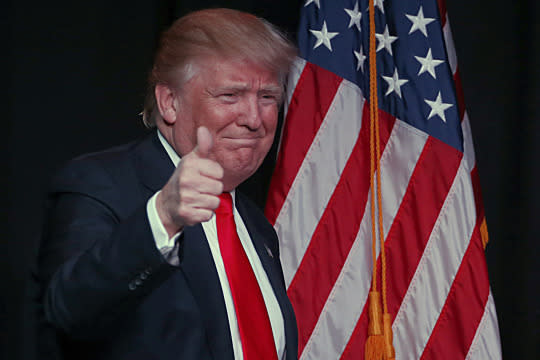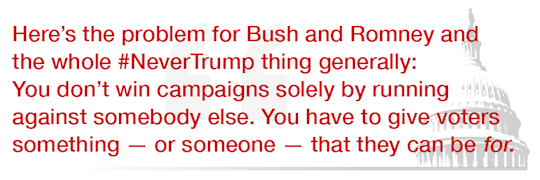Why #NeverTrump Will Never Work

The goal of the #NeverTrump movement is to keep Donald Trump from amassing the 1,237 delegates he needs to clinch the nomination. (Photo: George Frey/Getty Images)
We all had a good laugh at Chris Christie’s expense after the New Hampshire primary, when he decided to get behind Donald Trump in exchange for dibs on an especially comfortable chaise longue at Mar-a-Lago. Next to the kinds of craven endorsements we’re seeing now, though, Christie might be in line for a Profile in Courage award.
Just yesterday, Jeb Bush followed his pal Lindsey Graham by coming out in support of Ted Cruz, although apparently he didn’t think he could get through an actual announcement without falling to his knees and rending his clothes in self-loathing, so he released a tepid statement instead. Bush described Cruz as a “consistent, principled conservative who has demonstrated the ability to appeal to voters,” by which he meant that Cruz is not Trump and that’s all there is to say.
This followed the bizarre contortions of Mitt Romney, whose state-by-state endorsement strategy has been so convoluted that I’d suggest getting a blank NCAA bracket if you really want to keep up.
All of which gets to why this #NeverTrump movement among governing Republicans might more aptly be called #NeverGoingtoHappen instead.
That’s not to say I don’t understand the strategy here, because I do. The singular goal is to keep Trump from amassing the 1,237 delegates he needs to clinch the nomination, thus hurtling the party into an open convention for the first time in 40 years.
Bush has apparently decided that this can happen only if it’s a two-man race, even though he almost certainly believes that John Kasich is the only candidate left who has any business being in the Oval Office. So he and other leading Republicans are going to close ranks around Cruz and hope they can get control of the process once the voters are finished making a holy mess of it.

(It’s interesting that Jeb has not been joined in this cause by his brother George W., who seems to have decided that he would sooner paint Trump’s presidential portrait himself than endorse the fellow Texan who once worked for him. That ought to tell you something.)
Romney’s strategy is more elaborate. Like many of you who probably also assumed you were watching an old “Bewitched” rerun on daytime TV until you realized that Darrin had just way too many lines, I watched Romney’s speech attacking Trump a few weeks back, and I have to say I was impressed. Where Trump was vulgar and insecure, Romney was cutting and confident, reminding us that titans of business don’t hawk bad steaks in late-night infomercials.
It seemed possible that Romney, in his advancing years, had at last found within himself some hidden reserve of political steel.
But no – turns out some distant race of extraterrestrials had actually snatched Romney’s body for a day so they could deliver a message about the grave danger of a Trump presidency, and when they were done they dropped the old Romney right back into our laps.
Romney endorsed Kasich in Ohio, noting that he was the “only guy with a real track record.” But then he turned around and announced he was voting for Cruz in Utah anyway – although he wasn’t actually endorsing Cruz, just so nobody gets confused. Right.
If you step back for a second, you can see why Romney might have some interest in getting to a convention with the delegates divided as many ways as possible. Mitt made his fortune as the consummate turnaround guy — the bloodless analyst who swoops into a company in crisis and fires all the incompetent executives.
What is the Republican Party now if not an organization in crisis? If you were Romney, why wouldn’t you look at the disaster looming and recognize a ripe takeover opportunity?
But here’s the problem for Bush and Romney and the whole #NeverTrump thing generally: You don’t win campaigns solely by running against somebody else. You have to give voters something — or someone — that they can be for.
This, of course, was Romney’s essential flaw as a nominee four years ago. He effectively ran as the #NeverObama candidate, avoiding anything that could have been misconstrued for a declarative worldview or agenda. He thought it was enough to not be Barack Obama and not be objectionable, and he was wrong.
That’s pretty much how Jeb! ran his campaign this year, too. First he was the anti-Clinton, and then he was the anti-Trump. The ubiquitous exclamation point hinted at the hole in his campaign, which is that in the end he offered nothing for anyone to be genuinely enthusiastic about.
That’s almost never enough in politics, which is why governing Republicans will almost certainly end up ruing their missed opportunities. As I’ve written before, there was a moment, in the week before the New Hampshire primary, when Marco Rubio, having surged out of the Iowa caucuses, seemed poised to emerge as the hopeful candidate of the governing class.
But then Christie dismantled Rubio on the debate stage, and the field didn’t winnow as it otherwise would have, and the party’s leaders continued to watch and wait. Rubio’s chance passed.

There was probably even a brief moment, right after New Hampshire, when Republican governors and lawmakers could have swung behind Kasich, who’d easily finished second in the primary, and who had the strongest governing record and approval ratings of anybody in the field.
But there again, the party elite cowered and dithered. They were afraid to get on the wrong side of the Trump brigades, worried about being embarrassed if they made the wrong choice.
Instead of shoring up a candidate they could enthusiastically be for, they continued to define themselves by the campaigns they were against, offering support only when it was already clear which way the voters were going. (For sheer spinelessness here, no one beats Florida’s governor, Rick Scott, who declined to endorse anyone until the day after his state’s primary, when he boldly threw his weight behind the guy who had won by almost 20 points.)
Even at this late hour, you have Scott Walker, erstwhile candidate and two-term governor of Wisconsin, refusing to endorse a candidate in the April 5 primary there, although he hinted he would probably back Cruz at a moment of “maximum impact.” Maybe that means he’s discovered a time machine.
Because it’s almost certainly too late now to derail Trump. So if you’re going down anyway, at least go down with some conviction. At least stand up for Kasich, a candidate you think can actually win and actually govern, as opposed to a guy we all know you can’t stand.
The bottom line is that you can’t beat Trump by underscoring the central theme of his ignoble campaign, which is exactly what all this strategic endorsing is bound to do.
Trump has gotten to where he is by savaging the Republican establishment as expedient and craven — politicians willing to sacrifice any principle to preserve their own power. It’s amazing that Republican leaders seem so hell-bent on proving him right.

